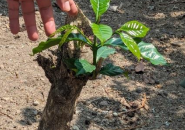Soon it will be time to seed your lawn if you want a cool season lawn. Many of you have shade trees and buildings that cast shade that you plant into a lawn. So a question I am often asked, “What’s the best shade grass for Kansas?” The answer is simple but requires explanation. Tall fescue is the best shade grass for Kansas. That does not mean that tall fescue is the best shade grass of all those grown. True fine leaf fescues such as sheep’s fescue, hard fescue, and creeping red fescue are actually better adapted to shade than tall fescue, but they have difficulty surviving Kansas summers. It might be better to say that tall fescue is the best shade grass adapted to Kansas conditions. Although tall fescue is our best shade grass, that does not mean that tall fescue is all that good in the shade. Large trees that produce deep shade will not allow tall fescue to survive over the long term. I say “over the long term” because fall-planted cool-season grasses will often do well under shade trees through the fall and spring when there is less leaf cover and growing conditions are better (cooler and moister) than in the summer. We often see people plant tall fescue in the shade each fall and then wonder what happens the following summer. The answer is stress from multiple fronts. Sunlight that passes through the leaves of trees has had most of the “good” light that drives photosynthesis stripped out. The grass struggles to make the food it needs for survival and growth. When this poor diet is combined with the additional stresses of drought and heat, tall fescue is unable to survive.
So, what should you do if you have too much shade for your turf? You have three choices. Reduce the shade by pruning up the lower branches of your trees so more early and late sun reaches the turf. This is not practical with many trees because it can destroy the desired shape. A second option is to plant a groundcover that is well-adapted to shady sites such as periwinkle or English ivy. Another solution would be to mulch the area under the tree.





